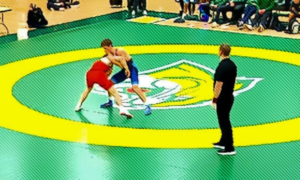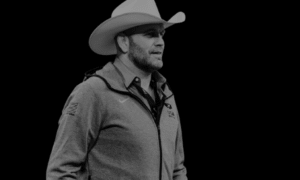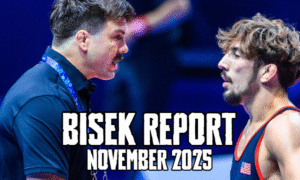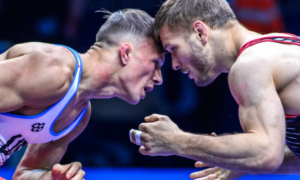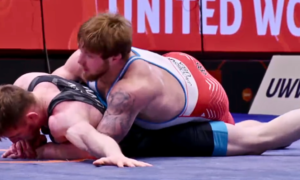Five Point Move is proud to host US Greco Roman National Team Head Coach Matt Lindland every week for “Coach Lindland’s Report.” For fans and wrestlers looking for insights regarding the US Greco National Team, we ask Coach Lindland some questions to get his take on training and upcoming competitions. If you have any questions you’d like us to ask going forward let us know via Facebook, Twitter, or through our Contact page.
This week, we catch Coach Lindland as the first week of Olympic Camp in Colorado Springs begins to wind down. He provides a detailed look at how the week has gone in terms of actual training, and we even get a glimpse at what the rest of the month might look like. Also discussed is the importance of Andy Bisek (75 kg) and Robby Smith (130 kg) being the leaders of the US Greco squad and what qualities define that role. Oh, and since a few Junior World Team members made it out to the OTC this week, we decided to ask the coach about that, as well. Enjoy!
5PM: How has the first official week of camp been going?
Coach Matt Lindland: The camp is going fine. So far we’ve had two days of full-on live wrestling. The rest of it has been kind of maintaining that base conditioning and then our power. We want to make sure we do a lot of power. After doing the testing, we met with our sports physiologist and started making a couple of adjustments in our training plan, lengthening the recoveries between the hard go’s so we can maximize the vO2 max power in the live go’s so they are getting full one-on-one recovery. With the one minute live, they get a minute recovery in a lot of these go’s. In the two, three minutes, they’re getting full recovery so we can give max effort and focus on that vO2 -max system. And we’ve laid a really good base on the guys. Their thresholds are very sufficient and we want to get that max cardiovascular output.
5PM: Is the plan to eventually shorten up recovery in between the live go’s?
ML: Lengthen. We are lengthening the recovery.
5PM: Okay, lengthening. I had it criss-crossed.
ML: Yeah, lengthening. Because typically, three minutes you’re going to recover 30 seconds. That’s a match. Sometimes you think about, Well, I want these guys to be fully recovered, I want them to give maximum output, so we’re going to lengthen the recovery from 30 seconds to a minute. You know, based on what we’re seeing in the testing of our athletes and based on where we’re at as far as wanting to peak them, we’ve increased our recovery sometimes up to three minutes between three minute go’s. It’s a two-pronged effect. We’re keeping our athletes well-recovered, peaking them. And we’re also getting maximum training, the maximum effort when we’re looking for the vO2 max. If they are only recovering for 30 seconds, they are only able to go so hard during that second three-minute period. I mean, a lot of times you’re just working on your heart and desire to want to win, and we’re going to see that in competition. But we don’t necessarily need that right now. We need our athletes recovered and peaking at the right time.
5PM: Along with using heart-rate monitors and other scientific resources, do you notice with your own eyes the difference with the recovery? From session to session, even?
ML: Yeah, I can see that the athletes are way more recovered coming into the next practice. Going into the next training phase, whatever that is. Say we did six times three minutes on our feet and now we’re going to do 12 par terre go’s, this is something where we’re seeing a lot more recovered athletes. They are able to go a lot higher based on our demands and what we are asking of them.
5PM: We’re at July 14th. Are they off during the weekends or are you bringing them in on Saturday?
ML: Saturday we have our “Rio Matches”, which is the same thing as a match. The length is the same as a match, other than there is no 30 second break and you have a new opponent on you every minute.
5PM: Every minute?
ML: Every minute for six minutes. So we’re going to work our lactate threshold, build up vO2 max on this. We’re going to do two of those with 30 minutes in between each one. We’ve done different versions of these during different phases of our training. Sometimes, we’ve built the lactate up before the guy gets on the mat by doing a six-minute sprint on the AirDyne followed by either one minute of push-ups or one minute of the battle ropes as hard as they can, so they are building that lactate up in their muscles for seven minutes before they step on the mat. But this is not the time for that, to build up that lactate because they are going to do it in the matches anyway. So we really don’t want to overdose it.
And like I said, we want our guys peaking and recovering. That’s just too much volume at this time in the game.
5PM: On a side note, six minutes on an AirDyne? I can’t even fathom that.
Coach Matt Lindland: Six minutes as hard as you can go on an AirDyne, a minute of battle ropes and then wrestle another man for six minutes (laughs). Yeah, that is not what we’re doing this Saturday. We’re just doing the one minute part. Each athlete will do his Rio warm-up, the warm-up he’ll do in Rio for the Games. He’ll do his Rio cool-down protocol, which is typically six to seven minutes. Each athlete kind of has his own warm-up, his own recovery protocol that they do. It’s a ritual, you know? Kind of build these rituals in, just reviewing those rituals and training them on Saturday. They’ll bring food to practice, they’ll bring a banana and re-hydrate and refuel up between rounds, and then they’ll do it a second time.
So you know, it’s a simulation. The warm-up, the cool-down, all of that, other than you won’t have a new guy every minute (laughs). Each guy is going to have a fresh opponent standing in front of him. One minute he’s going to have one guy, the next minute, the next minute, and the next minute. And then they’re going to repeat that.
5PM: That’s interesting because for years I had always heard about the “grind matches.”
ML: Oh yeah, Coach Fraser was big on the grind match. A grind match was usually a minimum of one hour, sometimes two hours. So yeah, I think everyone has heard of the grind match, Coach Fraser was at the helm of the ship for 18 years and that was one of his big training tools. This is certainly not the time or place for a grind match. But for six minutes with a new guy on you every minute, that is a grind of its own. That’s a whole different kind of grind. It’s different philosophies, as well. We’re not wrestling an hour or two hours, we’re wrestling six minutes. So we’ve got to train and prepare to wrestle six minutes as hard as we can. We got to score points, we got to make multiple attacks, we have to get our opportunities on top so we can turn our guys. But I definitely think the guys who wrestled during Steve’s era did see benefits from grind matches, but they are not a peaking tool.
5PM: So with all of these descriptions of what is going on with the current camp, I can now see it all piecing together. From the base conditioning in Concord, the Azerbaijan camp, this whole concept of peaking. The relationship from the time you guys leave for Brazil to what has been going on.
ML: Changing the length of the recovery between the matches, not only that, we changed the length of the recovery between workouts. We had the two live training days, today and Monday were our live training sessions. So Monday and Thursday we went live. We didn’t do any live wrestling between those days. Saturday we’re going to do 12 minutes of live wrestling. Then next week we take a break, we don’t go live until Tuesday. Then we don’t have anymore live wrestling that week. So next week, live wrestling one day. Other than our two Rio matches, which we’re going to do twice for this camp.
If you look at our schedule, both workouts were 21 minutes of live. Today was 21 minutes of live, both workouts. We’ll have our two Rio matches on Saturday, we’ll have Sunday off. Monday morning, the guys will have a base run and then in the afternoon, they’ve got a 30-minute drill. Our sports psychologist Jack Stark is coming in on Monday, he’ll be around Tuesday, and is going back Wednesday before he meets us in Rio.
Jack has been a friend of mine since 1991 when I got to Nebraska and he started working with the Huskers of the 90’s. It was one of the most successful programs out of any sports franchise, basically. He was part of that coaching staff when they won three national titles and made it to the finals four times. But if you asked him who the best coach on the planet is, he would probably say Coach Denney, who he also worked with when he won seven consecutive national titles, or something like that? Then they dropped the program at Omaha and he went over to Maryville where he’s already won a national title. What, he’s been there three years now? So it’ll be nice to have Jack out here. We will have some downtime with our training and the guys will get to work on psychological skills during this phase of the training camp. So yeah, it is all coming together, isn’t it?
5PM: What have Bisek and Robby meant as captains and leaders of the team?
ML: In every sense of the word, these guys are absolute leaders. You couldn’t, as a head coach, ask for two better men to lead this program. I mean, we talk a lot about the young guys coming up, but I don’t want to ever neglect that as coaches, we could not do what we do if it wasn’t for these two athletes leading the program from within.
5PM: You have coached a lot, different teams in different situations. What qualities do you look for out of your captains, especially in the context of the current Greco team?
ML: I think the first quality is humility. Especially with Andy, you saw that when he was working at a liquor store and winning World medals. In between practices, going to the liquor store. Here is a guy who has two kids and a beautiful family and still is able to do what he does. I mean, most of these guys are like, If I don’t get my nap… Imagine going home to an infant and a toddler and not getting a nap, yet you’re still the first guy at practice and the last guy to leave. But when he does leave, he rushes out of the room to go see his family. He does that.
I think Robby’s qualities, he’s a lot more boisterous than Andy. Andy leads a little more by example, the way he works through everything. Robby’s the guy who brings everyone together. He’s a guy we put young athletes with to mentor them. His roommate for the last two years has been a 17 and a 18 year old young man who he’s brought under wing and taught him, This is how you act as a young athlete. He has not only had to show him that, but explain that to him. It’s not a process of “tell a kid one time and he’s going to get it.” You’ve got to keep preaching that stuff to him.
So yeah, they are both everyday leaders. They can say one thing to one of the other athletes and completely tear them up or build them up, and I’ve never seen them tear down anybody. It doesn’t matter if it’s the guy who doesn’t belong in that room because of his abilities and his skill-set. Or if it’s the next guy who is going to be a World medalist and World champion. They constantly build others up and you need that in your room. I think the only guy I would say is like that and he’s not on our Olympic Team this year but he’s been on a lot of teams, is Spenser Mango. He had those same kind of qualities.
5PM: And finally, you have some Juniors who have been out this week. Who exactly is out there and how has that been going?
ML: It’s great because when we need these young athletes to jump in with what we’re doing, they already know what is being asked of them and what their role is here. I think we made that clear at the beginning of camp and they embraced that. We’re here, but this is the Olympic Team’s camp and our camp is in two weeks. But if we don’t need them, they’re mirroring the same workout we’re doing on the four mats on the other side of the room. There’s a lot of extra volunteer coaches here to work with them. The athletes who are here – Randon Miranda, Dalton Roberts, Taylor LaMont, Kamal Bey, and Tracy Hancock. The rest of the guys are expected to show up the week of their camp, which is the 25th through the 30th.
5PM: This seems like another great opportunity. Some of these Juniors had the chance to work alongside the Seniors and Olympians in Concord and now here’s another opportunity in Springs. That could build a lot of confidence for those who participate heading into France, right?
Coach Matt Lindland: Yes, absolutely. I think any time you get to work with the Senior-level athletes and you’re still a Junior, you’re going to benefit from that. They will build their confidence. I see their desire to not only train and prepare, but to get better. They are learning the philosophy of what we want, which is, We’re not looking to make teams, we’re looking to dominate at the World level and bring home medals from international tournaments. Whether that’s the Olympic Games or the World Championships, Junior or Senior level, the goal is to go get the gold and they understand that philosophy. They’re seeing what it takes and are able to be in the same environment and learn that. We still have a pretty young team, to tell you the truth. Dalton is a Senior athlete next year, (Jamal) DeArmond is a Senior next year, Tracy has another Junior year, Kamal will have two more years, Taylor has another year.
So a lot of these guys are young, they will be on the Junior circuit for at least another year, but they understand our expectations of what it takes to be a Senior-level athlete before they are. That way, by the time they’re here, they are already acclimated to what it takes and the expectations. I think it is beneficial not just for this year, but also to the longevity and development of our Greco program. And they will set that tone at whatever clubs they are at or Northern Michigan. Northern Michigan has three on the Junior World Team and five on the University World Team. It seems that the NMU program has picked back up to when people were calling it the heyday, when Ivan (Ivanov) was there and Jim Gruenwald. And I think it’s not just the coaches up there, but also the athletes getting out of that environment and training at international camps, training in Colorado, training in Concord. When they train with these Senior-level athletes they are able to bring back something and say, Look what I picked up, here’s what I learned at camp. Andy showed me this, Robby helped me with this little thing. Or one of the coaches. So they are able to bring that stuff back to their rooms and their environments. And these guys are getting better because of that as a whole.
Be sure to follow Coach Matt Lindland on Facebook, Twitter, and his official blog for updates as we head closer to the Rio Olympics.



